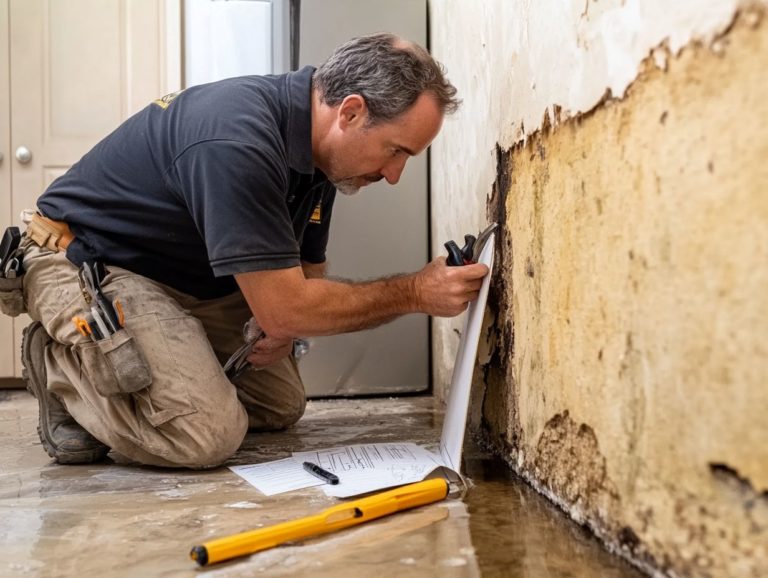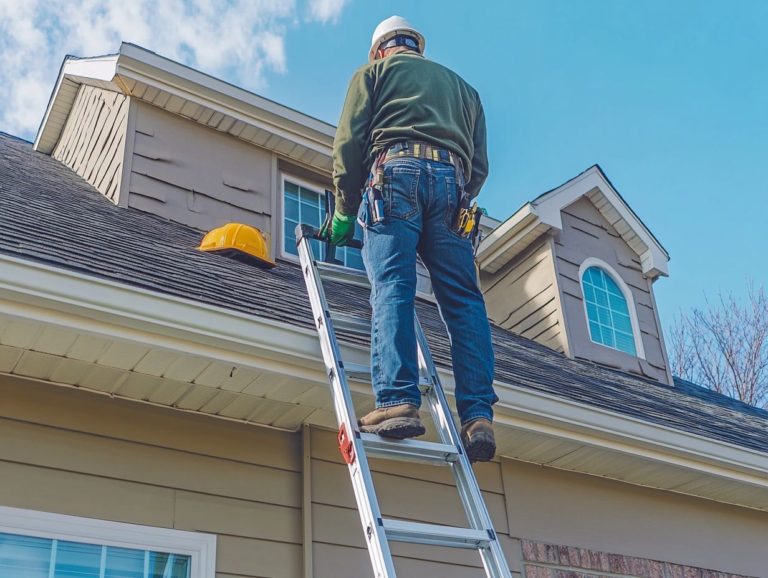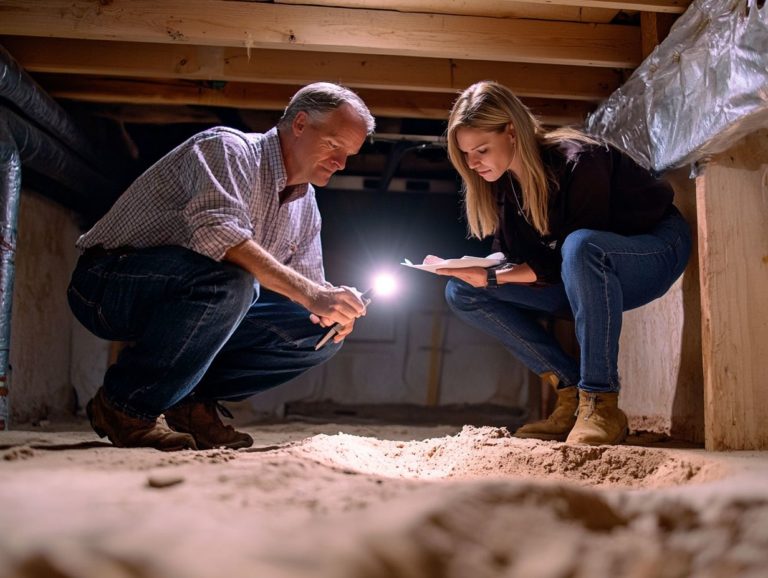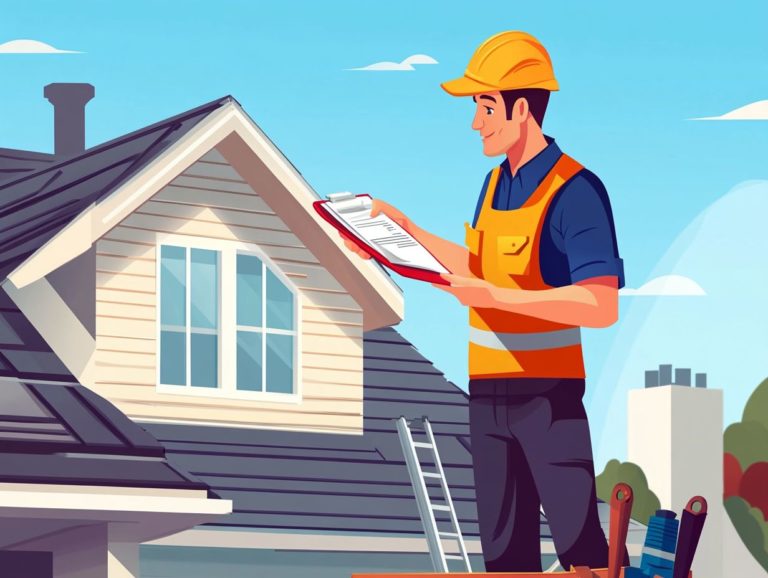How to Evaluate Home Inspection Findings
When you embark on the journey of purchasing a home, understanding the nuances of home inspections can significantly influence your experience.
A comprehensive inspection shows the real condition of the property, bringing to light any potential safety hazards and structural concerns that may affect your investment.
This guide walks you through the essentials of home inspections, from deciphering reports and identifying common issues to addressing findings with confidence.
You ll find valuable tips on choosing the right home inspector, ensuring peace of mind as you navigate this exciting chapter of your life!
Contents
- Key Takeaways:
- Understanding Home Inspections
- Interpreting Home Inspection Reports
- Key Components of a Home Inspection Report
- How to Read and Understand the Findings
- Common Issues Found in Home Inspections
- Structural and Safety Concerns
- Electrical and Plumbing Problems
- Addressing Home Inspection Findings
- Tips for Choosing a Home Inspector
- Frequently Asked Questions
Key Takeaways:
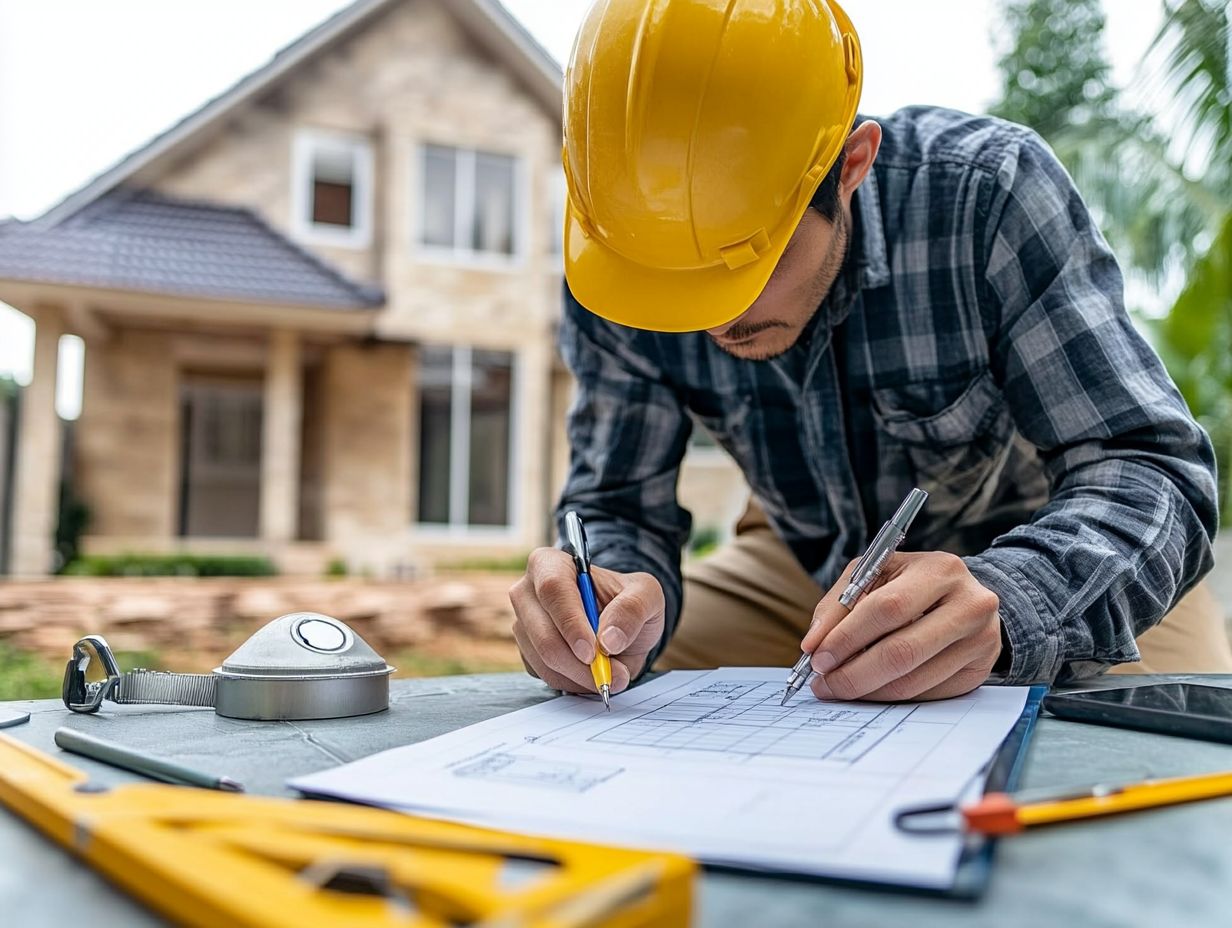
Home inspections are crucial for understanding the condition of a property!
Be sure to review the findings carefully to make smart decisions about purchasing a property.
When addressing home inspection findings, consider the severity of the issues and explore options for interpreting them.
Understanding Home Inspections
Understanding home inspections is essential for both home buyers and sellers. These inspections provide a detailed report on the property’s condition.
They cover critical systems like plumbing, electrical, and HVAC (Heating, Ventilation, and Air Conditioning), while also highlighting safety concerns and potential major repairs that could influence the home s overall market value.
A certified home inspector carefully checks the property against established safety regulations, ensuring that a detailed assessment is documented for your reference throughout the home sale process.
What is a Home Inspection?
A home inspection is a detailed visual examination of a property’s major systems, including the roof, foundation, plumbing, electrical, and HVAC systems. Conducted by a certified home inspector, this process aims to identify any areas of concern that could impact the safety and functionality of your home.
During this comprehensive evaluation, inspectors assess the condition of these vital systems, searching for signs of wear, damage, or potential hazards such as mold or pest infestations. To ensure you get the most thorough evaluation, consider following tips on how to make the most of your home inspection.
They meticulously inspect structural elements like beams and walls, ensuring everything is sound and free from excessive cracking.
The importance of a home inspection report cannot be overstated; it serves as a critical document for prospective buyers, enabling them to make informed decisions, negotiate necessary repairs, or even reconsider their purchase altogether.
By understanding the state of major systems, homeowners can effectively plan for future maintenance or upgrades, ultimately safeguarding their investment.
Importance of Home Inspections
Home inspections play a crucial role in the home sale process, offering you essential negotiation leverage. They give you the power to request repair credits or cost estimates for any significant issues identified, which can profoundly influence your decision and the final sale price.
The insights gleaned from a thorough inspection often lead to a renegotiation of the deal, allowing you to reassess your budget and make informed choices about moving forward with the transaction.
This can result in requests for repairs before closing, which in turn can affect timelines and expectations on both sides.
By uncovering hidden issues, inspections enable you to strategize effectively, ensuring you won’t be blindsided by unexpected repair costs.
In today s competitive market, it s vital for you to recognize your responsibilities in this process. By demonstrating due diligence through inspection reports, you can enhance your bargaining power and facilitate a smoother transaction overall!
Interpreting Home Inspection Reports
Interpreting a home inspection report is crucial for grasping the true condition of a property. These reports are typically rich in detail, offering comprehensive assessments of significant repairs, so knowing what to look for in a home inspection report can make a significant difference.
They often include thermal imaging and photo documentation that draw attention to structural concerns and outline the necessary repairs to ensure the home adheres to safety standards.
Understanding this information gives you the power to make informed decisions about your potential investment.
Don’t wait get your home inspected today to protect your investment!
Key Components of a Home Inspection Report

A home inspection report includes key components. This covers the exterior condition and evaluations of major systems such as electrical, plumbing, and HVAC.
It also contains detailed notes on significant issues uncovered during the visual inspection. The report typically features sections focused on the roof’s integrity, foundation stability, and safety elements like smoke detectors and handrails.
Each component is carefully checked by trained professionals, who meticulously analyze both visible and accessible areas. Their findings are documented with precision, often enhanced by photographs and specific recommendations for repairs or further evaluations.
This thorough documentation not only gives prospective buyers the power to make informed decisions but also serves as a valuable resource for current homeowners striving to maintain their properties efficiently.
How to Read and Understand the Findings
To fully grasp the findings of a home inspection report, focus on the areas of concern highlighted by the inspector. It’s important to pay particular attention to safety issues and general repair needs that could affect both the livability and value of the property. Knowing how to evaluate a home’s condition can also provide valuable insights during this process.
By recognizing technical jargon and understanding what each issue means, you empower yourself as a homeowner or potential buyer to make informed decisions. For example, terms like “exposed wiring” or “foundation cracks” may raise alarms; however, understanding their context and severity is crucial.
An inspector might categorize certain conditions as “immediate repairs needed” or “monitor for future concern.” This helps you determine whether to negotiate repairs or budget for ongoing maintenance.
Categorizing findings by urgency, such as electrical safety or plumbing integrity, allows you to prioritize action steps. For more insights on handling your findings, consider how to use home inspection reports effectively. This ensures that immediate health risks are addressed while planning for cosmetic improvements down the line.
Common Issues Found in Home Inspections
During home inspections, you’ll frequently encounter common issues that warrant your attention.
Structural concerns often arise, including:
- Foundation problems
- Roof conditions in need of repair
- Deficiencies within the electrical and plumbing systems
These issues can pose significant safety risks and should be addressed promptly to ensure the integrity and security of your home.
Structural and Safety Concerns
During a home inspection, you may uncover structural and safety concerns. These could include significant foundation issues, compromised roof conditions, and other factors threatening both the integrity of your home and the safety of its occupants. After the inspection, it’s important to know what to do after a home inspection to address these issues effectively.
Home inspectors often emphasize the risk of water damage from leaks or inadequate drainage systems. These can lead to mold growth and pose potential health hazards for those residing in the property.
Outdated electrical systems can present fire risks, further jeopardizing the safety of residents. Ignoring these crucial concerns might lead to costly repairs and erode your property’s value, dissuading future buyers.
Actively addressing these findings protects your investment and ensures a safe living environment.
Electrical and Plumbing Problems
Electrical and plumbing issues often arise during home inspections. Major concerns like outdated wiring, improper installations, or leaks present serious safety risks that require immediate attention to adhere to safety standards.
Neglecting these problems can have far-reaching consequences, including significant financial repercussions, such as expensive repairs or a decrease in property value.
Outdated electrical systems not only elevate the risk of fire but may also fall short of current code requirements. Plumbing problems, like hidden leaks, can lead to structural damage over time, fostering mold growth and jeopardizing your property s integrity.
By prioritizing these repairs, you enhance your safety and ensure your property remains compliant while retaining its market value. Don’t wait tackle these issues now!
Addressing Home Inspection Findings

Effectively addressing home inspection findings requires exploring a range of options for dealing with identified issues. This may include negotiating repair credits or agreeing on specific repairs before finalizing the sale.
Such considerations can significantly influence the negotiation strategy between you, the buyer, and the seller. They shape the outcome of the transaction in your favor.
Options for Dealing with Issues
Home buyers and sellers have various options when it comes to addressing issues uncovered during a home inspection. You can request repair credits, negotiate cost estimates for repairs, or use the findings as leverage in your negotiations.
Each strategy has its advantages and disadvantages, so choose wisely. For instance, requesting repair credits allows you the flexibility to tackle issues at your own pace. However, sellers might prefer to address problems upfront for a smoother transaction.
Negotiating repair costs can sometimes prolong the process as both parties seek fair estimates. Leveraging inspection findings during negotiations can be a powerful tactic for reducing the sale price. But if not handled with care, it can lead to tensions.
Effective communication and compromise are key don t overlook them!
Tips for Choosing a Home Inspector
Selecting the right home inspector is crucial and requires careful consideration of their qualifications and experience.
A certified home inspector, meaning someone who has received formal training and certification, will conduct a meticulous inspection process and provide a comprehensive report. This equips you with essential insights for informed buying or selling decisions.
Qualifications and Credentials to Look For
When you re in the market for a home inspector, seek professionals who are certified and have credentials from reputable organizations like InterNACHI. These qualifications reflect their expertise and dedication to industry standards.
Certifications indicate a solid grasp of the inspection process and a commitment to ethical guidelines and ongoing education. You ll want a home inspector with the relevant state licenses, which require passing rigorous exams and completing continuing education courses. This ensures they stay informed about the latest building codes and safety practices.
Inspectors with specialized certifications, such as those focusing on mold, radon, or energy efficiency, offer an extra layer of assurance. This gives you peace of mind, knowing that potential issues are reliably addressed.
Questions to Ask During the Inspection Process
Ask the right questions during the inspection process! Inquire about specific areas of concern the inspector has noted, methods used during the inspection, and any issues needing immediate attention.
These questions provide clarity and empower you to make informed decisions regarding your property. Understanding the inspector’s assessment of structural integrity highlights potential risks.
Consider asking how long certain issues have existed, as this indicates whether they need urgent repairs or can be monitored over time. Discussing recommended maintenance practices equips you with knowledge to preserve your home s condition.
Addressing these pivotal questions ensures you fully grasp the inspection’s implications, including the most common findings in home inspections. This ultimately enhances your ability to negotiate repairs or adjust future maintenance plans.
Frequently Asked Questions
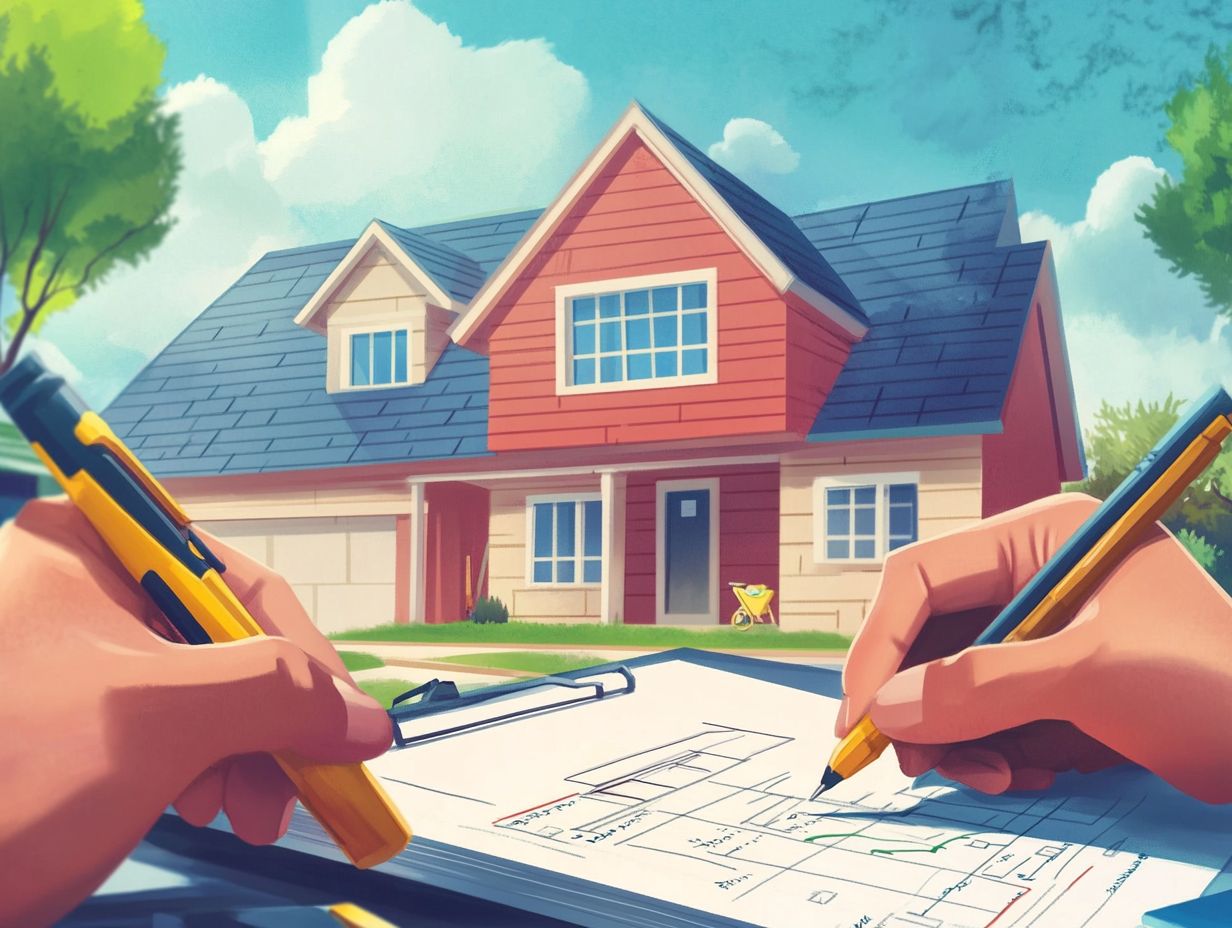
What is a home inspection and why is it important?
A home inspection is a thorough examination of a home’s condition, typically done before a real estate transaction. It’s important because it can identify potential problems or safety concerns, providing buyers with crucial information to make informed decisions.
Ready to get your home inspected? Contact a certified inspector today!
How do I choose a reputable home inspector?
Research home inspectors by reading reviews from past clients. Ask friends or real estate agents for recommendations.
Ensure the inspector is licensed and experienced with the type of property you are buying.
What should I expect during a home inspection?
A home inspection includes a visual evaluation of the home’s structure, systems, and important features.
Inspectors may also check for pest infestations or radon gas. You will receive a detailed report outlining their findings.
How do I evaluate the findings in a home inspection report?
Focus on major issues that could affect the safety or value of the home.
Look for red flags that need immediate attention. To gain clarity, consider discussing the findings with your real estate agent or a trusted contractor, and refer to how to read and interpret your home inspection report for further insights.
What if the home inspection uncovers major problems?
If major problems arise, you have options.
You can negotiate with the seller for repairs, request a price reduction, or back out of the deal. Discuss your choices with your real estate agent to understand potential costs.
Should I attend the home inspection?
Attending the home inspection is highly recommended.
You can see potential issues firsthand and ask questions directly. If you can’t attend, thoroughly review the inspection report and discuss any concerns with your agent.


